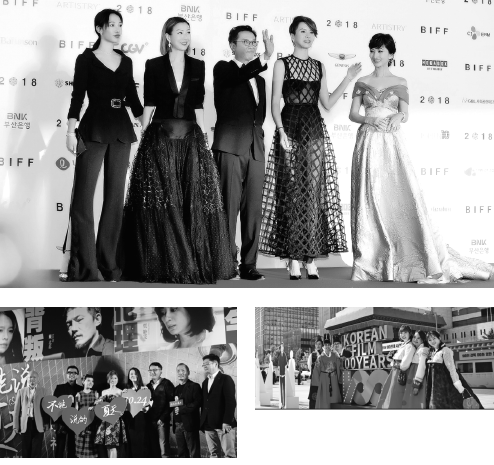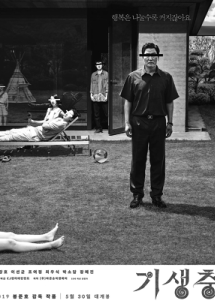ROK FILMMAKERS FOCUS ON SENSITIVE ISSUES
Storylines frequently touch on society, politics

When Bong Joon-ho's black comedy thriller Parasite won the Palme d'Or at this year's Cannes Film Festival, the 50-year-old director from the Republic of Korea described the success as a timely gift for his country.
Bong is the first director from the ROK to win the top award at the festival-held in the south of France-after last appearing in competition there with Okja in 2017. He is also the second successive Asian winner, after Japanese director Hirokazu Kore-eda triumphed last year with Shoplifters.
In a congratulatory letter to Bong, ROK President Moon Jae-in said that the Cannes award was a meaningful gift for the public, referring to this year's 100th anniversary of the Korean film industry.
"The status of Hallyu culture has risen one step higher," Moon said. Hallyu, or "Korean Wave", refers to the global popularity of Korean culture.
"Director Bong's movies start from our everyday environment to show the dynamism and values of everyday life. It is amazing how he finds stories from mundane life," Moon said, adding that he cannot wait to watch Parasite.
Debate has raged about when motion pictures first arrived on the Korean Peninsula-it was around a century ago, and may even have been as early as 1897.
The first movie made on the peninsula was The Righteous Revenge, directed by Kim Do-san-a mix of theatrical play and film, in which the actors performed against a backdrop of projected motion pictures. It premiered at the Danseongsa Theater in central Seoul on Oct 27, 1919, now considered to be the birth-date of Korean film.
After the Korean War (1950-53), the two neighbors on the peninsula parted ways, as did their film industries.
As the ROK rose from the ashes of the war, its film industry began to boom, with the number of movies produced increasing from just 15 in 1954 to 111 the following year.
In recent decades, the ROK has made a concerted effort to become the world's leading exporter of popular culture, and the success of its films has created a tremendous buzz.
Directors such as Boon, Kim Ki-duk and Im Kwon-taek have broadened their horizons in an attempt to make movies that are more influential internationally.
In China, many movies from the ROK are often referred to as "bold, brave and realistic" as they frequently touch on sensitive issues such as social reality and politics.
Parasite, which revolves around class struggles set in the present-day ROK, follows a family of four that is down on its luck, and manages to find jobs in a wealthy household. Two families-the Kims and the Parks-are portrayed in the movie. While the Kims try to climb the social ladder by leeching off the wealthy Parks, the latter are worried about poor people's body odor.
Bong describes his movie as "a candid portrayal of the rich and the poor".
"I think we're touching on courtesy toward human beings-human dignity. Whether one becomes parasitic or symbiotic and coexists in the best sense, I think might depend on how much courtesy one has toward human beings," he said at a news conference in Seoul in May.
While Parasite is the first film from the ROK to win the Palme d'Or at Cannes, it is not the first of the country's numerous movies to portray social reality. In recent years, criticizing social phenomena and politics has become prevalent in ROK films.
Fan Weiqing, an associate professor from the Theater and Film Academy at the Communication University of China, said many stories in ROK films reflect local issues, which are also problems faced by many other countries. "They resonate at home, but also help tap international audiences," she said.
"Being interesting, meaningful and moving are the three key elements for a successful movie, and ROK films achieve all three. Hightech skills have been learned from Hollywood movies, and most important, the makers know how to express people's inner voices by putting some touching elements into their movies," Fan said
A comment piece in The New York Times said the reason such movies from the ROK surprise and delight international audiences is that they "look below the surface". "These movies both reinforce certain Confucian values and simultaneously combat stereotypes about Asians: that they are obedient, dutiful, loyal, timid and fearful," the article said.
In the ROK, there is an active group of "Generation 386" directors-those born in the 1960s and who went to college in the 1980s. They include Park Chan-wook, who was born in 1963, and Bong Joon-ho, who was born in 1969.
Like the New Wave movement in French films, Generation 386 has fundamentally shaped the current ROK movie industry. Through such movies, the pain of political repression, national division and dictatorial rule has been alleviated.
Many Generation 386 directors were involved in the democratization movement in the ROK in the 1980s.
Although they also hope to helm "blockbuster" movies, a term they learned from Hollywood, these directors' hits rarely feature superheroes. Instead, their stories are nearly always based on real life and end in tragedy.
One aspect of ROK films' love for realistic subjects is their penchant for justice and crime.
The Attorney, which unexpectedly proved popular in China in 2013, is based on the "Burim case" in 1981. In that year, 22 students, teachers and office workers who were members of a book club were arrested without warrants on fabricated charges that they were Democratic People's Republic of Korea sympathizers. Moon, now the ROK president, was one of the legal team defending those arrested against the government.
The movie Silenced, released in China as Melting Pot, was also based on a real-life incident, at the Gwangju Inhwa School for the hearing-impaired in the ROK. Young deaf students were the victims of repeated sexual assault by faculty members at the school for five years.
When it was released in 2011, the film sparked public outrage, which eventually resulted in investigations into the incidents being reopened.
After more than 4 million people in the ROK had seen the film, the demand for legislative reform eventually reached the National Assembly, where revised legislation, dubbed the Dogani Bill, was passed in October 2011. This abolished the statute of limitations for sex crimes against minors and the disabled.
Fan, from the Communication University of China, said ROK films express individual rights by focusing on people, country and politics, and packaging these three factors with fascinating stories to produce realistic movies with local characteristics. Parasite is certainly typical of this Korean genre, she said.
In addition to the uniqueness of their scripts and expressions of aesthetic art, the films also resonate among audiences with specific tastes, Fan said.
According to the Korean Film Council, box-office revenue in the ROK last year rose by 3 percent, to $1.61 billion from $1.56 billion in 2017. Although the country has a population of just 51 million, it has one of the world's highest per-capita movie attendance rates.
Fan said it is not Hollywood blockbusters or commercial films that will succeed in the ROK. "Audiences prefer movies with stories that resonate with life and are artistically well-made. Their choice of films puts great pressure on directors and producers to produce better movies."
To help widen the influence of the country's films, the Korean Film Council has vigorously promoted cooperation with other nations. A committee, which is a state-supported, self-administered organization responsible to the country's Ministry of Culture, Sports and Tourism, promotes and supports the production of domestic films through various methods of funding, research, education and training.
Filmmakers from China and the ROK have sought frequent cooperation in recent years.
In addition to remakes of ROK movies such as Big Match, Peace Breakers and More than Blue, they have introduced the concept of "one script, two films", meaning that with the same story outline, Chinese and ROK creators use and jointly develop localized adaptations.
Successful examples of this include the films shown in China as 20 Once Again and Lost, Found. In the ROK, they were titled respectively Miss Granny and Missing.
Movie critic Shi Chuan said the geographical and cultural proximity of China and the ROK has led to cooperation on many film and television productions.
Shi said that although ROK films have gained a certain amount of recognition, and are unique in the international movie industry, if China wants to learn one thing from its neighbor's experience, it is that filmmakers should keep trying and be innovative.
"It's difficult for a story to be cross-cultural, as there are still differences between the ROK and Chinese cultures. The scope for cooperation between the two countries in the film market is relatively large, but it still needs to be explored slowly."

































